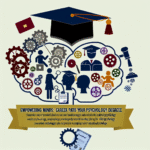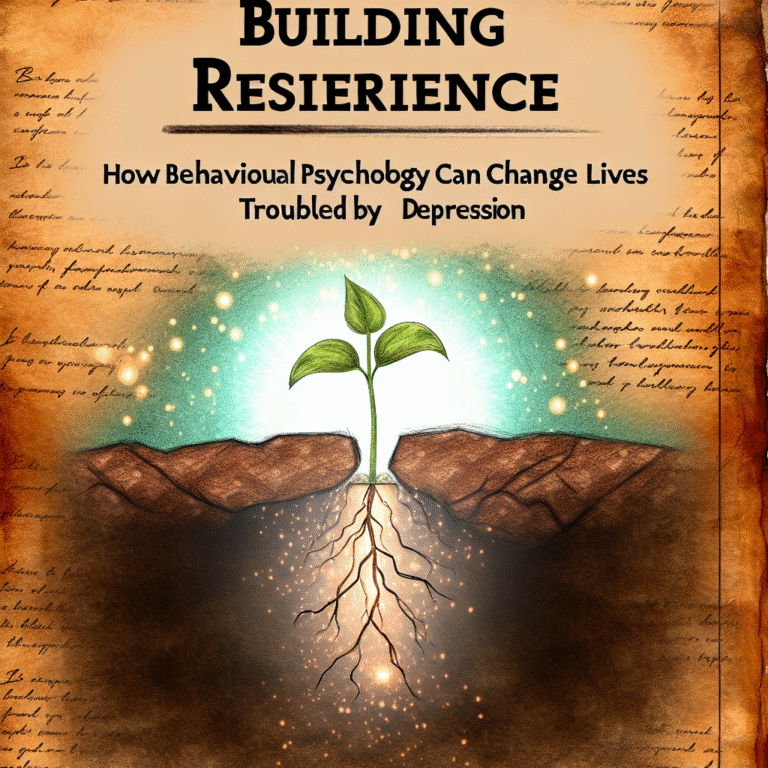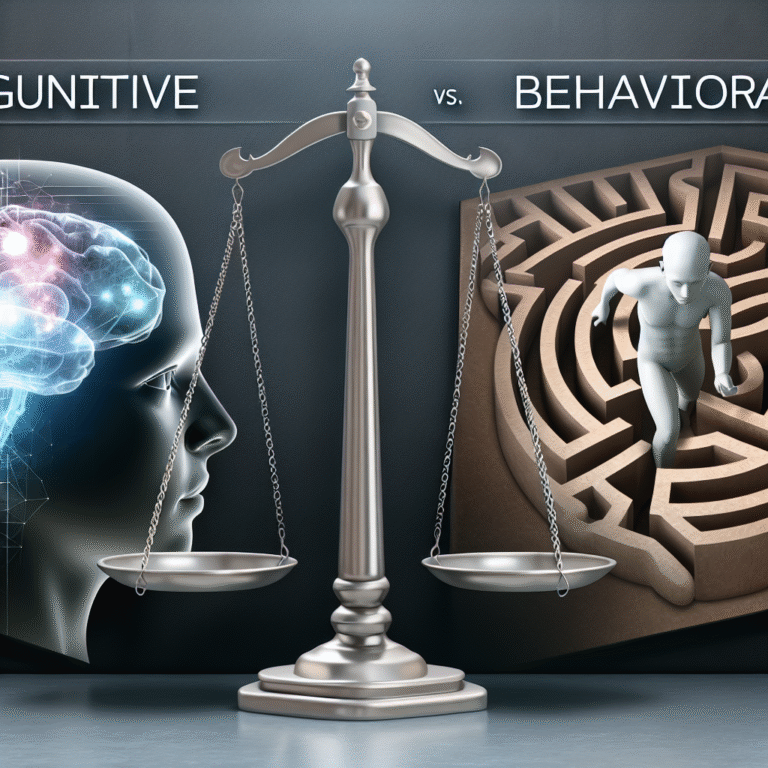
Cognitive Tools for a Calmer You: Essential Behavioral Psychology Insights on Stress Management
Introduction
In our fast-paced world, stress has become a common, almost unavoidable companion. Whether it’s the pressures of work, deadlines, or the complexities of personal relationships, stress can manifest in numerous ways, impacting our mental and physical well-being. Understanding stress management has never been more crucial, especially when seeking effective solutions to achieve a calmer state of mind.
When we explore Cognitive Tools for a Calmer You: Behavioral Psychology Insights on Stress Management, we unlock essential strategies that address the root causes of stress rather than merely alleviating its symptoms. This article delves into these cognitive tools, providing valuable insights from behavioral psychology that can transform how we approach stress. By leveraging these strategies, we can cultivate resilience, enhance our emotional well-being, and create a more balanced life.
Understanding Stress and Its Impact
The Nature of Stress
Stress is a biological reaction that prepares us to respond to challenges or threats. It can motivate us to meet deadlines or perform at our best, but excessive stress can lead to significant health issues, including anxiety, depression, and chronic diseases. This understanding sets the stage to explore effective stress management strategies through cognitive tools.
The Role of Behavioral Psychology
Behavioral psychology focuses on how our thoughts, feelings, and behaviors interconnect. By employing cognitive tools that target these elements, we can develop healthier responses to stressors. Cognitive behavioral therapy (CBT), for instance, is rooted in this psychological approach, emphasizing the transformation of negative thought patterns into more constructive ones.
Cognitive Tools for Stress Management
1. Cognitive Restructuring
Cognitive restructuring involves identifying and challenging unhelpful thought patterns. This tool is fundamental in managing stress and is often utilized in cognitive-behavioral therapy.
Case Study: A 32-year-old accountant named Sarah experienced anxiety and overwhelming stress during tax season. By incorporating cognitive restructuring, she learned to identify her catastrophic thinking—believing that one mistake would lead to dire consequences. Through therapy, she replaced these thoughts with more rational perspectives, allowing her to approach her work with a calmer mindset.
Analysis: This case illustrates the vast potential of cognitive restructuring as a stress management tool, demonstrating how altering thought patterns can lead to reduced anxiety levels.
2. Mindfulness and Meditation
Mindfulness practices help ground individuals in the present moment, providing respite from stress. Techniques like meditation and deep-breathing exercises are effective cognitive tools for calming the mind.
Table 1: Benefits of Mindfulness-Based Stress Reduction (MBSR)
| Benefit | Description |
|---|---|
| Reduced Anxiety | Decreases physiological responses associated with stress. |
| Improved Focus | Enhances attention and concentration. |
| Emotional Regulation | Promotes better mood stabilization. |
| Enhanced Resilience | Facilitates coping strategies in adverse situations. |
Case Study: John, a marketing executive, reported high levels of stress due to workplace competition. By participating in an eight-week MBSR program, he became adept at mindfulness meditation. Over time, his ability to manage stress improved significantly as he experienced increased focus and emotional resilience.
Analysis: John’s experience underscores the applicability of mindfulness as a valuable cognitive tool for managing stress—reflecting how intentional practices can cultivate a more soothing mental environment.
3. Journaling
Journaling serves as an effective cognitive tool that allows individuals to articulate their thoughts and emotions. This practice can lead to deeper insights into personal stressors and foster emotional release.
Case Study: Lisa, a university student, struggled under the pressures of academics and social life. Initially reluctant to journal, she eventually adopted it as a routine. Over several months, her entries revealed recurring themes of self-doubt and fear of failure. By recognizing these patterns, she was able to address and reframe her concerns more constructively.
Analysis: This case effectively highlights the therapeutic potential of journaling as a cognitive tool for stress management, showcasing how reflective writing can promote clarity and emotional well-being.
4. Problem-Solving Techniques
Effective problem-solving is a critical skill that can alleviate stress by empowering individuals to navigate challenges more successfully. This cognitive tool involves breaking down larger issues into manageable steps.
Case Study: During her final year of graduate school, Emily faced overwhelming responsibilities between her studies and internship. By applying problem-solving techniques, she broke her tasks into specific weekly goals, prioritizing what was urgent and important. As a result, she found herself less stressed and more productive.
Analysis: Emily’s story illustrates how structured problem-solving serves as a practical cognitive tool, illustrating its effectiveness in reducing feelings of being overwhelmed, ultimately leading to a calmer mindset.
5. Positive Affirmations
Positive affirmations act as a buffer against negative thoughts, fostering a more supportive internal dialogue. This cognitive strategy can significantly impact how individuals perceive and react to stress.
Case Study: Mark, a sales manager, faced constant pressure to meet targets. Initially plagued by self-doubt, he began practicing positive affirmations daily, focusing on phrases like "I am capable" and "I can handle whatever comes my way." Over time, his confidence grew and his stress levels decreased noticeably.
Analysis: Mark’s experience exemplifies how positive affirmations can transform one’s mindset and emotional resilience in high-pressure situations, thereby serving as an effective cognitive tool for stress management.
The Science behind Cognitive Tools
How Cognitive Tools Affect the Brain
Behavioral psychology reveals that cognitive tools positively influence brain function. Cognitive restructuring, for instance, can alter neural pathways associated with stress responses. Research indicates that consistent practice of mindfulness can reduce the size of the amygdala—the part of the brain responsible for stress reactions—demonstrating that our mental strategies have profound implications for our mental health.
Measuring Effectiveness
Quantifying the effectiveness of cognitive tools within stress management can be achieved through surveys and psychological assessments. Tools such as the Perceived Stress Scale (PSS) can track reductions in stress levels as individuals engage with these cognitive tools over time.
Crafting a Personal Stress Management Toolkit
Steps to Create Your Toolkit
- Identify Your Stressors: Begin by recognizing the sources of your stress.
- Select Appropriate Cognitive Tools: Choose a couple of tools to test their effectiveness for your situation.
- Monitor Progress: Use journals or apps to track your stress levels and reflections.
- Adjust as Needed: Tailor your toolkit based on what resonates most with your experiences.
Conclusion
In navigating the complexities of life, the ability to manage stress is pivotal. The insights gained from understanding Cognitive Tools for a Calmer You: Behavioral Psychology Insights on Stress Management equip us with practical strategies to confront life’s challenges with greater composure. By integrating cognitive tools such as mindfulness, cognitive restructuring, and journaling into our daily routines, we lay the foundation for a healthier, balanced approach to stress management.
As you walk away from this exploration, consider implementing at least one cognitive tool into your life. You have the power to cultivate a calmer you and lead a more fulfilling life devoid of excessive stress.
FAQs
1. What are cognitive tools in stress management?
Cognitive tools are strategies derived from behavioral psychology that help individuals alter their thought processes and behaviors to manage stress effectively. They include techniques like cognitive restructuring, mindfulness, and journaling.
2. How can mindfulness impact stress levels?
Mindfulness practices, such as meditation and deep breathing, can reduce physiological stress responses, improve focus, and foster emotional stability, leading to lower overall stress levels.
3. Is journaling effective for everyone?
While many find journaling beneficial, its effectiveness can vary based on individual preferences. Those who enjoy reflection and expression often gain the most from this cognitive tool.
4. How does cognitive restructuring work?
Cognitive restructuring teaches individuals to identify negative thought patterns, challenge them, and replace them with more rational and positive thoughts—ultimately reducing stress and anxiety.
5. Can positive affirmations really help with stress?
Yes, positive affirmations help combat negative self-talk, foster self-compassion, and encourage a more optimistic mindset, significantly aiding in stress management.
Incorporating these insights and tools into daily life can help minimize stress, leading to a more balanced and fulfilled existence—one where tranquility is within reach.















